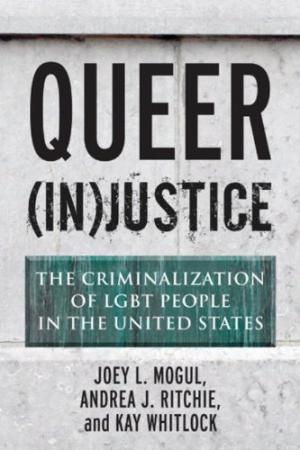Queer (In)Justice: The Criminalization of LGBT People in the United States

In their near-exhaustive catalogue of violence, discrimination, and systematic abuse of LGBT people in the United States, Joey Mogul, Andrea Ritchie, and Kay Whitlock outline the specific ways that the criminalization of lesbians, gays, bisexuals, transgendered people has perpetuated inequalities not only based on sexual identity but also within the complex interplay of race, class, and gender. While many leading texts in LGBT studies have argued that the policing of gender leads to toxic consequences for all members of society, this book reveals just how pervasive such policing of gender is and just how complicit we are in maintaining these systems of inequality. Most centrally, Mogul, Ritchie, and Whitlock argue that decriminalizing queerness has been sidelined by efforts to merely remove legal sanctions—a problem that fails to address the basic assumptions of queer deviance at play in our legal system.
Queer (In)Justice dispenses a legal history of LGBT oppression that spans hundreds of years, beginning with a sweeping review of the history of gender policing—indigenous abuse, constructions of African people as hypersexual, “contaminating” immigrant bodies, and even Biblical ideas about sodomy—and moving through a range of topics that collectively provide the most complete picture of LGBT criminalization I have ever encountered. Addressing queer criminal archetypes (e.g., the queer killer, sexually degraded predator, disease spreader, and queer security threat) early in the book, the authors then move to three stellar chapters on legal policing of gender in clubs and public spaces, courtroom battles about queer identity (where gender bending and violence are discursively linked), and, finally, the queering of prisons. This last chapter on prisons provides a haunting account of prison guards ignoring sexual identity-based violence, refusing care for HIV/AIDS prisoners, and constructing queer inmates as perverse. The authors conclude (in one of only a few hopeful moments of the book) that anti-police-brutality, the building of safe communities, prison solidarity, and community organizing must occur in order to tease apart the conflation of queerness and criminality.
At times devastating, provocative, explicit, and horrifying, this book will make you deeply sad, deeply angry, and more fully aware of how far we really are from full equality for sexual minorities. The authors argue, essentially, that cases like Matthew Shepard and Brandon Teena are not isolated incidents of violent, hateful oppression, but rather, engendered by the very system that supposedly protects queer subjects. From senseless police brutality to justifying death penalty sentences based on sexual identity, from the fetishization of “lesbian killer” Aileen Wuornos to prison guards who allow continued sexual assault against “willing” gay men in prison, hatred of queerness exists at the heart of our criminal justice system. The question becomes: What legal, discursive, social, and institutional changes can we enact that more radically and permanently divides queerness from criminality? What stories must we tell (or learn) to communicate and understand the histories of violence lesbian, gay, bisexual, and transgendered people have endured? And, finally, what kind of queer justice should we seek?